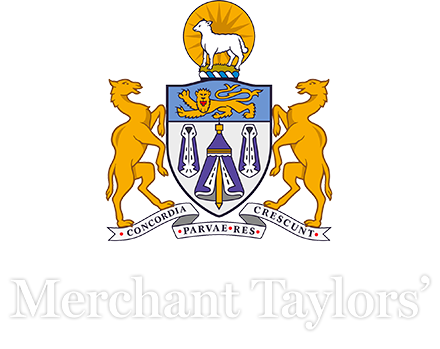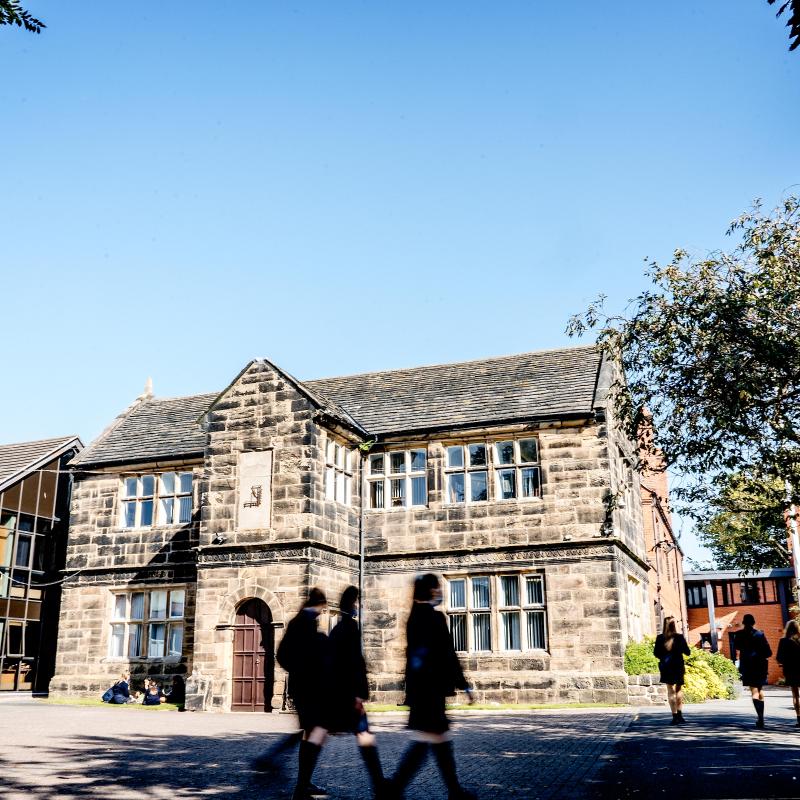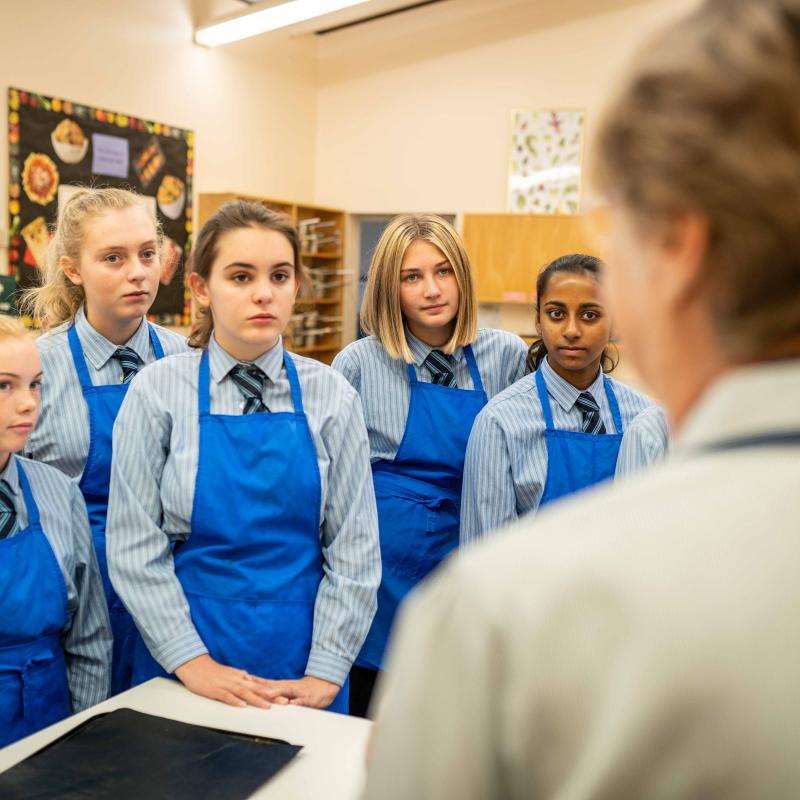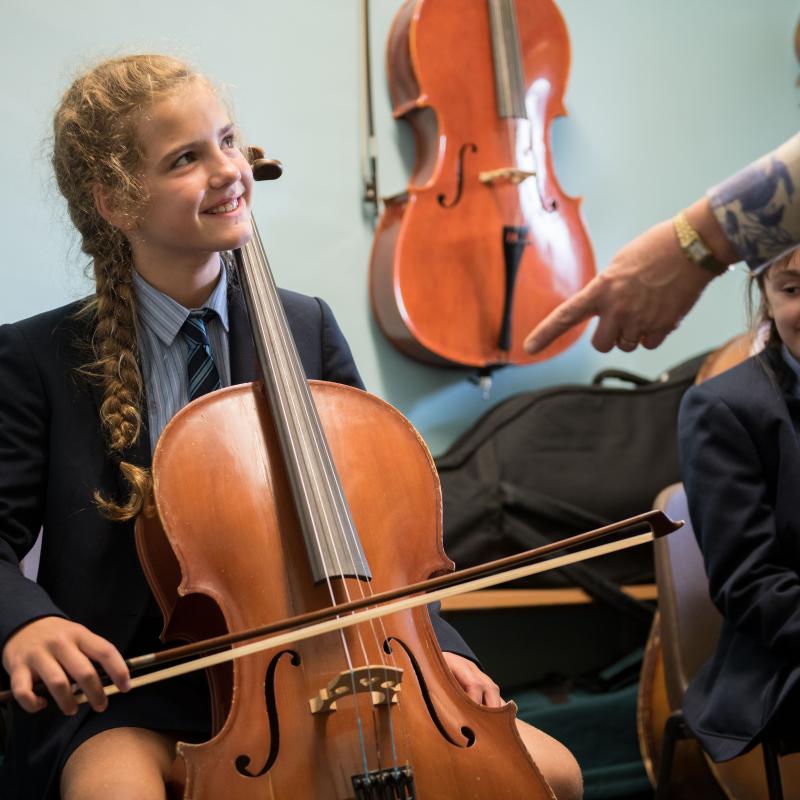Modern Foreign Languages
The Modern Foreign Languages department teaches 4 different languages, namely French, German, Mandarin Chinese and Spanish. Combine traditional teaching methods with modern technology, ensuring that every girl has the opportunity to succeed and enjoy her studies.
It is a highly successful department, achieving consistently outstanding external examination results across all three European Languages at both GCSE and A Level. Mandarin Chinese is currently taught in Year 7-9 and we look forward to enjoying the same examination success here in future years, as our pupils reach Year 11.
Girls not only have access to the latest resources in our four dedicated classrooms, but also at home where they can use online textbooks, recommended websites and the library of support and revision materials available on our Firefly pages.
We know, however, that the enjoyment of learning a language comes, not only from academic success, but also from using the language outside of lessons. As such, we offer a variety of opportunities for our girls to use their language skills beyond our classroom walls. Examples include:
- Year 7 Spelling Bee in all 4 languages taught
- Year 7 Language Clubs
- Online Spanish conversation exchanges for Year 10 and above
- French, German and Spanish Mary Glasgow magazine subscriptions for all year groups
- Foreign Film Clubs
- A range of authentic reading materials in all languages
The ability to speak a foreign language is an invaluable life skill that opens doors into new cultures, new skills, new career paths and new opportunities worldwide. At MTGS we are committed, not only to helping each and every one of our pupils achieve the highest grade she can but also, to opening her eyes to the world around her and helping her access and navigate it.
Lower School
All girls joining us in Year 7 study 2 languages, both of which they continue throughout Year 8. We follow the Allez (French), Echt (German), Jin Bu (Mandarin) and Claro (Spanish) textbooks, which provide a solid grounding in the vocabulary, grammar and examination skills needed to succeed at GCSE.
In Year 9, girls have the option to continue studying both languages or to drop one of them and focus their efforts on the other. We follow the AQA-approved GCSE textbooks in the European languages and Pearson textbooks in Mandarin Chinese.
Girls begin studying for the GCSE in Year 9. This allows them plenty of time to learn the required vocabulary and skills needed to excel in the examination at the end of Year 11. It also provides opportunities for activities beyond the mastery of the language, such as learning about foreign traditions, music and literature.
GCSE
We currently offer French, German and Spanish at GCSE, all following the AQA specification. Mandarin Chinese will be offered at GCSE in the future, when our eldest cohort of learners reach Year 10.
Girls who have studied just one language in Year 9 continue with that language at GCSE. Girls who have studied 2 languages in Year 9 have the option to continue with one or both of those at GCSE level.
Each GCSE course features four areas of language skill – Listening, Speaking, Reading and Writing – taught across three themes, which are as follows:
1. Identity and culture – incorporating the topics of ‘Me, my family and friends’, ‘Technology in everyday life,’ ‘Free-time activities’ and ‘Customs and festivals’.
2. Local, national, international and global areas of interest – incorporating the topics of ‘Home, town, neighbourhood & region’, ‘Social issues’, ‘Global issues’ and ‘Travel and tourism’.
3. Current and future study and employment – incorporating the topics of ‘My Studies’, ‘Life at school and college’, ‘Education post-16’ and ‘Jobs, career-choices and ambitions’.
The four skills are equally weighted at 25% each of the final grade. All papers must be taken in the same exam series (in the summer term of Year 11).
Girls have 2 lessons each week with a specialist language teacher, during which they cover the required content, practise the necessary skills and master the grammar needed to succeed at GCSE. In addition, they have a lesson in a small group with a native speaker of the language studies. This provides girls with a superb opportunity to practise for their speaking examination, building their confidence and improving their pronunciation.
Girls have access to a wide range of resources, both in school and at home, to help them succeed. We also offer regular support clinics for those wanting additional help with their studies.
A Level
We currently offer A Levels in French, German and Spanish, following the AQA specification. As at GCSE, our girls benefit from lessons both with subject specialists and native French, German and Spanish speakers. Wherever possible, girls have individual lessons with the native speakers, offering truly bespoke tuition and practice.
During their A Level studies, our girls develop a high level of linguistic fluency, providing them with an excellent foundation for further study. Whilst further mastery of the language is the main objective, the courses offer a vast array of different subject matters and areas of interest. They include the study of a country’s culture, its history, religion and civil rights. Girls study literature and film, as well as debating current affairs such as immigration and politics. They are actively encouraged to notice the world around them, develop their own opinions and seek out alternative viewpoints. These courses help our girls to mature into true global citizens, with an understanding of, and appreciation for, their world and the people in it.
Furthermore, as part of their speaking examination, girls complete an Independent Research Project. This element of the course affords them the opportunity to research something which interests them and it allows them to begin developing research and presentation skills which are essential to success at university and beyond.
The A-Level qualification is linear and all papers are taken at the end of Year 13.
The examination consists of three papers:
1. Listening and reading comprehension, including a translation element.
2. Assessment of writing based on a literary text and a film.
3. Speaking
As with younger year groups, A Level students have access to modern resources both in school and at home. Teaching staff are always willing to help those who need extra tuition and we are very proud of our girls’ success in previous years.




